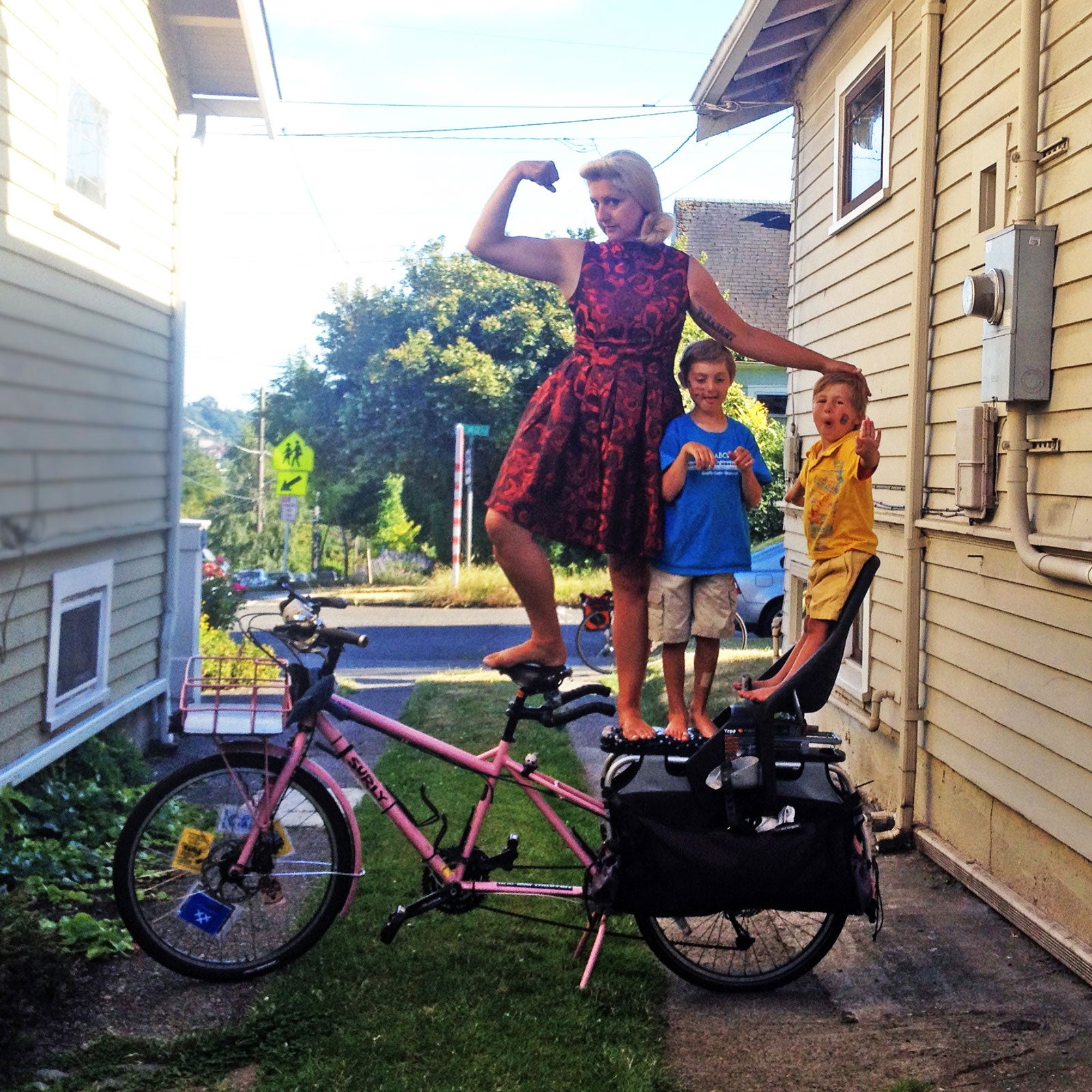What if bikes could save the world? The notion is as old as the bicycle itself, but it gets a refreshing new spin in the recently released documentary , produced and narrated by veteran filmmaker Liz Canning. The filmтАФwhich is an╠¤official selection at the San Francisco Green Films Festival, the Breckenridge Film Festival, and╠¤othersтАФcelebrates the humble beginnings and revolutionary potential of the utilitarian cargo bike, those iconic, long-tail steeds designed for schlepping kids, groceries, gear, and pretty much anything else you can lash on top or on the side.╠¤
Cargo bikes arenтАЩt sexyтАФat least not yetтАФbut neither is the world in which Canning finds herself after giving birth to twins in 2008. A former commercial filmmaker turned work-from-home mom, sheтАЩs tired and despondent, mourning the freedom of her life pre-kids and the ease with which she used to take to the roads on her bike. The message in the movieтАЩs opening scenes is familiar: child-rearing is an╠¤exhausting╠¤enterprise, and if youтАЩre not careful, youтАЩll spend 18 years behind the wheel, driving your kid to baby sing-along class and varsity soccer practice. Wake up when itтАЩs over, and youтАЩll be a shell of your former self.
Fortunately for Canning, she lives in Fairfax, California, the╠¤self-professed birthplace of mountain biking and a hotbed of cycling culture. When she begins noticing other parents pedaling cargo bikes online, she immediately wonders: Why were there no cargo bikes to be seen in Fairfax?╠¤
When she finally breaks down and buys the long-tail (her indecision serves a cinematic purpose, allowing her to digress into a brief but compelling history of bicycles and feminism), Canning discovers a fringe world of industrious, bike-obsessed individuals determined to improve their familyтАЩs health and happinessтАФand the planetтАЩsтАФby trading four wheels for two. They ride bulky made in Holland with wooden kid carriers that look like miniature dump trucks; jerry-rigged townie bikes with handmade planks for seats; and $5,000 electric-assist cargo bikes from companies like , whose founder, Ross Evans, developed the first long-tail cargo bike in Nicaragua in 1995.
You may not be able to live in╠¤your cargo bike, but you can live on╠¤it.
Canning is careful not to portray these parents as hardcore eccentrics or extreme athletes╠¤but as╠¤ordinary people in ordinary towns making out-of-the-ordinary choices, just like her.╠¤тАЬIтАЩm not an athlete. IтАЩm not superhuman,тАЭ says Brent Patterson, a father from Buffalo, New York. тАЬIтАЩm just a completely normal person like you.тАЭ ItтАЩs a heartening takeaway: if╠¤she can do it, so can we. She introduces us to people like Emily Finch, who carts all six of her kiddos around on two wheels, and Patterson's╠¤family that╠¤sold its╠¤car and travels by cargo bike year-round, even in snowstorms. Many of the people she meetsтАФespecially, it seems, the momsтАФendure all-too-rampant тАЬbikelashтАЭ from aggressive drivers who shout profanities out the window, accusing them of endangering their children. Not all live in bike-friendly communities like Marin County or Portland, Oregon, and not all are as comfortably off as Canning; some had to sell their car or take out a no-interest loan in order to afford a cargo bike.╠¤
Motherload is the story of one womanтАЩs emancipation from the drudgery of the carpool, the drop-off line, the grocery run, but itтАЩs ultimately an aspirational look into a global movement of alternative parenting. Cargo bikers are a pared-down version of╠¤#vanlife or #tinyhome╠¤devotees, who sell their houses and possessions to live with less. You may not be able to live in your cargo bike, but you can live on it.
And therein lies the filmтАЩs deeper appeal. What if itтАЩs possible for the humble cargo bike to rewrite the script for beleaguered American parents? Could a two-wheeled╠¤revolution be the antidote to our increasingly sedentary, tech-driven, risk-averse indoor lifestyle?
These are lofty claims, and Motherload stops just short of making them. It doesnтАЩt need to.╠¤The movieтАЩs enthusiasm for biking is contagious, and by the time the credits roll, youтАЩll be crunching numbers and fantasizing about selling your car and becoming a cargo convert, just like Canning. тАЬI love my life!тАЭ Finch exclaims. ItтАЩs a sentiment echoed by almost everyone in the film. Bicycling might be the answer to much that ails us, but at its heart, itтАЩs freedom on two wheels, a pure embodiment of joy, and quite possibly the closest we grown-ups can get to being kids again.╠¤


